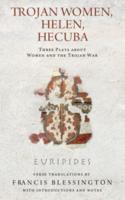
Wisconsin (2015) p/b 250pp £17.50 (ISBN 9780299305246)
Francis Blessington brings us a new translation of three tragedies by Euripides, Trojan Women, Helen and Hecuba – an unusual combination, perhaps, but one chosen because these three plays ‘dramatize the tragic fates of women in the wake of war’ and give ‘powerful portrayals of the suffering of both Greek and Trojan women as they become pawns and prizes of warring men’. Each play has its own introduction, plus a set of helpful endnotes explaining mythological names, places, events, etc.
The translations are admirable. The language is spare, direct, the words well chosen (as they would be, since B. is a poet in his own right). Sentences are short. And B. succeeds in making these plays feel like poetry by using a four-beat variable stress line for the iambic dialogue and freer verse for the lyrical parts, all the while remaining true to the Greek. To achieve both in combination is quite some achievement.
Two short samples must suffice to give a flavour of the whole, both taken from Trojan Women. First, Andromache to Astyanax (749–63):
O child, are you crying? Do you feel your fate?
Why grab me and hold my gown,
Huddling like a chick between my wings?
Hector won’t come, seizing his famous spear,
Coming up out of the earth to bring your deliverance,
No father’s kinsmen or Phrygian force,
But a horrible fall on your neck from on high,
Pitilessly breaking your breath.
O most beloved child, clasped in your mother’s arms,
O sweet smell of your skin! For nothing
This breast nourished you in baby clothes.
Useless, I wore myself out, wasted with work.
Now, and never again, embrace your mother,
Hug her who bore you, wrap your arms
Around my back and join lips.
And part of a choral ode (511-30):
Sing me dirges for Troy,
Weeping and new,
O Muse, a burial hymn.
I shall now cry out in song for Troy
How by the four-wheeled Argive cart,
I died a wretched captive of the spear.
Greeks left that gold-studded horse that creaked to heaven
Filled with armed men
At the city gates.
The Trojans on
The rock called out
‘Go! Ah! Our pain is gone.
Bring up the statue
To Zeus’ Trojan daughter.’
What girl did not go?
What old man from his home?
In song they found reckless
Treachery.
The introductions to the plays, though short, set them in context and raise various questions for discussion. For instance (Trojan Women again), how do the other plays in this loosely-connected trilogy of 415 affect our interpretation of this play? Is the play a protest against the Athenian massacre at Melos in 416, or the self-destructive Sicilian invasion of 415? Or is it a general condemnation of war? Or is the most important theme (and this seems to be B.’s conclusion) the heroic spirit of the Trojan women enduring the worst? ‘The human mind goes on living, coping, dreaming, remembering, despairing, changing, thinking, even philosophizing, and doing these activities over again, refusing to fall silent, refusing in its way to die.’
The book ends with a well-chosen bibliography with suggestions for further reading, and an appendix on the elements of Greek tragedy—an excellent succinct summary of what it was all about. In short, everything is here that should be here. Very highly recommended.
Jenny March
